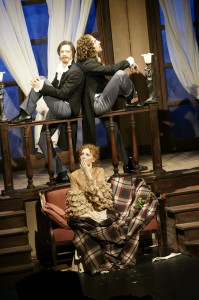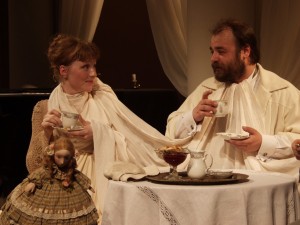Theater Review: An Inspiring “Family Happiness”
By Helen Epstein
After seeing many flat and boring adaptations of books over the past year, I recommend director Piotr Fomenko’s playful adaptation of Tolstoy’s Family Happiness to writers and directors wanting to turn literature into drama.
Family Happiness. Adapted from the novella by Leo Tolstoy. Directed by Piotr Fomenko. Staged by the Theatre-Atelier Piotr Fomenko. Presented by Maestro Artist Management and ArtsEmerson at the Cutler Majestic Theatre, Boston, MA, January 27.
Performances are in Russian with English subtitles.
It’s not every day that an adaptation of a Russian classic by a Russian master director sponsored by a Russian superstar comes to town and Boston’s Russian émigré community packed the Cutler Majestic Theater in their fur coats and hats. I was one of the small minority of non-Russians reading the supertitles projected onto a screen hanging from the proscenium, but as a longtime Tolstoy reader, I was eager to see Theatre-Atelier Piotr Fomenko’s production of Family Happiness.
Written at the end of the 1850s, after Tolstoy’s trilogy of memoirs Childhood, Boyhood and Youth, the novella was published when the author was 30. Although the characters in Family Happiness are fictionalized, the plot draws directly on Tolstoy’s experiences as a young man when he was trying to sort out love and marriage. It’s easy from the evidence of his diaries to identify Tolstoy as the awkward, “middle-aged”—36 is his age in the novella!—bachelor and 17-year-old Masha as Valerya Arseneva, an orphan whom the author toyed with marrying in his late 20s.
Tolstoy made Masha the narrator of the novella, and the late director Piotr Fomenko’s adaptation retains her role as the teller of the tale. But the director shatters the straightforward literary account into a sparkling kaleidescope of tableaux vivants, soundscapes, flashbacks, and circus-like scenes. Although Fomenko remains true to the text, his inventive adaptation is a free variation on Tolstoy’s work that takes it into absurdist realms, at times close to farce, and stakes out an even more cynical view of married life than Tolstoy did. I wondered how the author would have reacted, but there’s no question that this dramatized version makes for riveting theater. After seeing many flat and boring adaptations of books over the past year, I recommend Fomenko’s playful approach to writers and directors wanting to turn literature into drama.
Tolstoy’s epic novels War and Peace (1869) and Anna Karenina (1877) were years in the future when he began anticipating some of their themes in Family Happiness. How do men and women negotiate the conflicting demands of sexual passion and companionate love? How do they balance the wish for a peaceful if boring life with a desire for variety and excitement? The pleasures of the country and city? How do Christian values, Russia values, and western European values shape hopes and expectations? And what can a worldly Russian man expect from a nineteenth-century, Russian teenager, limited as her world is?
The play opens with the sound of bells on a candlelit, traditional stage set—a foreshadowing of the major roles both sound and light will play in this production. Masha—wearing the large, black hat and veil she dons in her role of narrator—rustles up and down the aisles urging the audience and perhaps herself to calm down, hush, get ready for the spectacle to unfold. It’s spring, the lilacs are in bloom, and white sheets—key props that are used to hide and reveal, bind, trip up, infantilize, and free the players—cover the furniture and the two pianos.
Ksenia Kutepova is a 20-year veteran of Fomenko’s school, and it is a measure of her exceptional skill that we believe her portrayal of a shrill, often ditzy 17-year-old girl in white underclothes as well as the sadder but wiser woman in the black hat. Although Kutepova premiered this role in Moscow 12 years ago, she has a freshness and energy that makes the demands of this physically challenging role look easy. Alexey Kolubkov, as Sergey, brings a well-meaning doltishness to his role that Fomenko (if not Tolstoy, who modeled Sergey on himself) clearly intended. They and the three supporting actors make up a flawless ensemble whose non-verbal skills are as polished as their delivery of their lines. The design team is equally proficient. I have rarely seen a production that so deftly uses every inch of performance space, as well as a wide variety of props, lighting, music, and costumes, to their best advantage.
For Baryshnikov, who gave the piece its American premiere at his Arts Center in Manhattan, Fomenko was a model creative spirit, a visionary who created not only a large body of impressive work but his own theater and school. This production Family Happiness is an homage to the theater artist’s memory: Fomenko died at the age of 80 in August 2012. I’m grateful that Baryshnikov, with an assist from Arts Emerson, enabled us to see this inspiring production in Boston.
Also see Arts Fuse’s interview with Family Happiness‘ lead actress, Ksenia Kutepova.
Helen Epstein is the author of Joe Papp: An American Life, Music Talks, and other books about the performing arts. She has written both memoir and biography and publishes classics of the genres at e-publisher Plunkett Lake Press.


